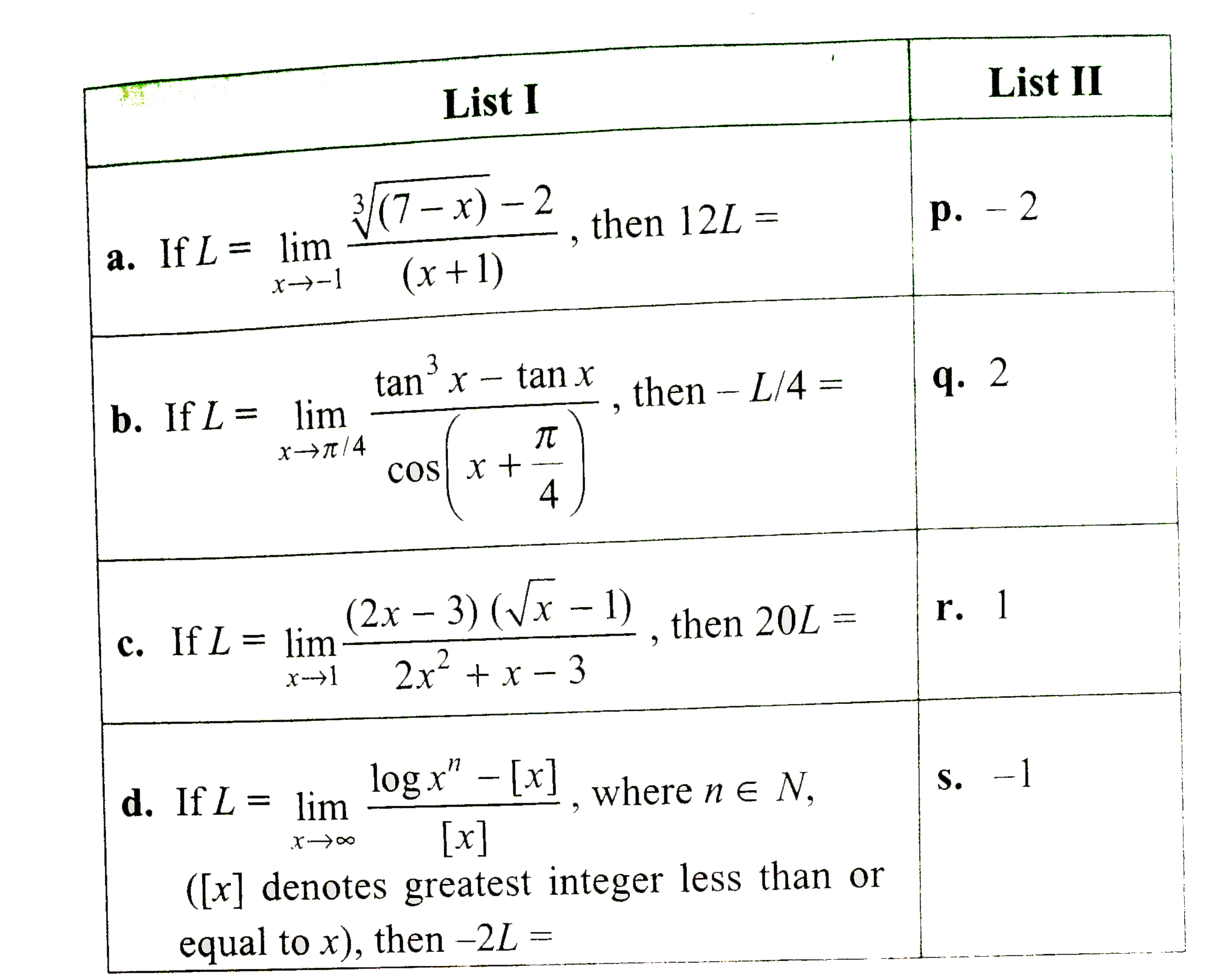Let Sn=1+2+3++n and Pn=S2S2−1.S3S3−1.S4S4−1...SnSn−1 Where n∈N,(n≥2). Then (lim)n→∞Pn=____Solution in Bengali
14
124
3
18
The correct Answer is:(3)
Sn=n(n+1)n and Sn−1=(n+2)(n−1)2
∴ SnSn−1=n(n+1)2.2(n+2)(n−1)=(nn−1)(n+1n+2)
∴ Pn=(21.32.43.54...nn−1)(34.45.56...n+1n+2)
=(n1)(3n+2)
∴ limn→∞Pn=3
Topper's Solved these Questions
- LIMITSBOOK - CENGAGE PUBLICATIONCHAPTER - LIMITSEXERCISE - Archives JEE MAIN
8 Videos
- LIMITSBOOK - CENGAGE PUBLICATIONCHAPTER - LIMITSEXERCISE - Archives JEE ADVANCED
2 Videos
- LIMITSBOOK - CENGAGE PUBLICATIONCHAPTER - LIMITSEXERCISE - Matrix Match Type
5 Videos
- JEE 2019BOOK - CENGAGE PUBLICATIONCHAPTER - JEE 2019EXERCISE - Chapter 10
8 Videos
- LINEAR COMBINATION OF VECTORS, DEPENDENT AND INDEPENDENT VECTORSBOOK - CENGAGE PUBLICATIONCHAPTER - LINEAR COMBINATION OF VECTORS, DEPENDENT AND INDEPENDENT VECTORSEXERCISE - DPP 1.2
10 Videos
Similar Questions
Let f:R→R be a positive, increasing function with
limx→∞f(3x)f(x)=1. Then limx→∞f(2x)f(x) is equal to
View SolutionIf limx→0[1+xln(1+b2)]1x=2bsin2θ,b>0andθ∈(−π,π]. then the value of θ is
View SolutionMatch the following lists:

View SolutionIf y = y(x) is the solution of the differential equation, xdydx+2y=x2 satisfying y(1) = 1, then y(12) is equal to
View SolutionThe number of integral values of p for which (p+1)ˆi−3ˆj+pˆk,pˆi+(p+1)ˆj−3ˆk and −3ˆi+pˆj+(p+1)ˆk are linearly dependent vectors is q
View SolutionIf S_1,S_2,S_3,...,S_n be the sums of first n terms of n G.P.'s whose first terms are each unity and the common ratios are 1, 2, 3,.....,n respectively, prove that S_1+S_2+2S_3+3S_4+.........+(n-1)S_n=1^n+2^n+3^n+....+n^n.
View SolutionIf alpha, beta are the roots of x^2 + x +1 = 0 and s_n=alpha^n+beta^n then |[3,1+s_1,1+s_2],[1+s_1,1+s_2,1+s_3],[1+s_2,1+s_3,1+s_4]|
View SolutionIf S1,S2,S3,………….Sn denote the sum of 1,2,3…………n terms of an A.P. having first term a andSkxSx is independent of x then S1+S2+S3+……..+Sn= (A) n(n+1)(2n+1)a6 (B) ^(n+2)C3a (C) ^(n+1)C3a (D) none of these
View SolutionLet alpha,beta , be the roots of the equation x^2+x-1=0 . Let S_n=alpha^n+beta^n "for" n ge 1 . Evaluate the determinant |{:(3,1+s_1,1+s_2),(1+s_1,1+s_2,1+s_3),(1+s_2,1+s_3,1+s_4):}|
View SolutionThe sequence of sets
S1,S2,S3,S4,... is defined as S1={1},S2={3,5},S3={7,9,11},S4={13,15,17,19}… etc.
The first element of the nth set Sn is:
View SolutionIf Sn denotes the sum of first n natural number then S1+S2x+S3x2+……+Snxn−1+……∞ terms =
View SolutionLet Sn=1+2+3++n and Pn=S2S2−1.S3S3−1.S4S4−1...SnSn−1 Where n∈N,(n≥2). Then (lim)n→∞Pn=____
View SolutionThe sequence of sets
S1,S2,S3,S4,... is defined as S1={1},S2={3,5},S3={7,9,11},S4={13,15,17,19}… etc.
The first element of the nth set Sn is:
View SolutionLet Sn(n≤1) be a sequence of sets defined by S1{0},S2={32,52},S3={154,194,234,274},.......then
View SolutionIf α,β are the roots of the equation ax2+bx+c=0 and Sn=αn+βn then evaluate ∣∣ ∣∣31+s1+s21+s11+s21+s31+s21+s31+s4∣∣ ∣∣
View SolutionIf S1,S2,S3,………….Sn denote the sum of 1,2,3…………n terms of an A.P. having first term a andSkxSx is independent of x then S1+S2+S3+……..+Sn= (A) n(n+1)(2n+1)a6 (B) ^(n+2)C3a (C) ^(n+1)C3a (D) none of these
View Solution
